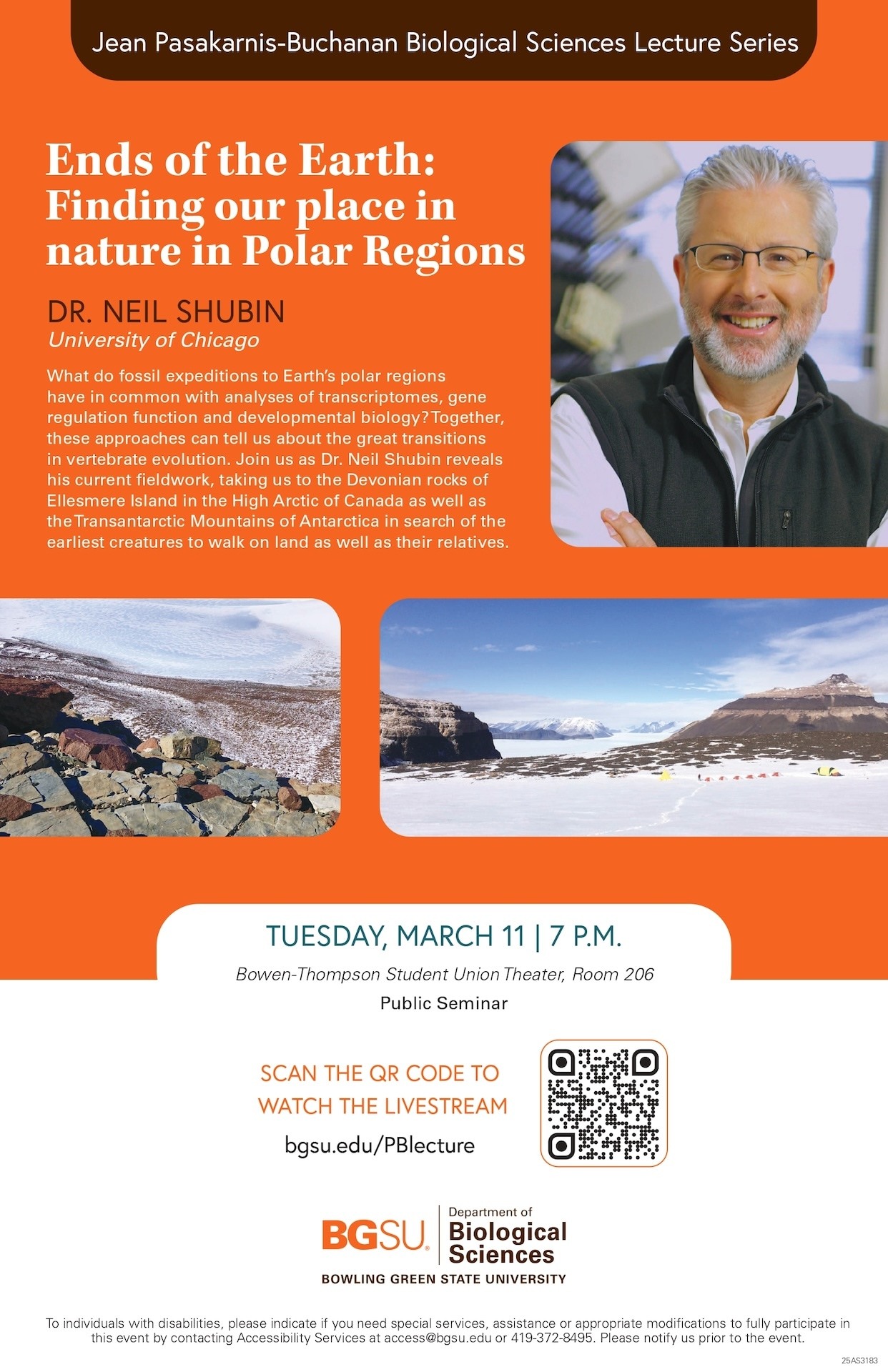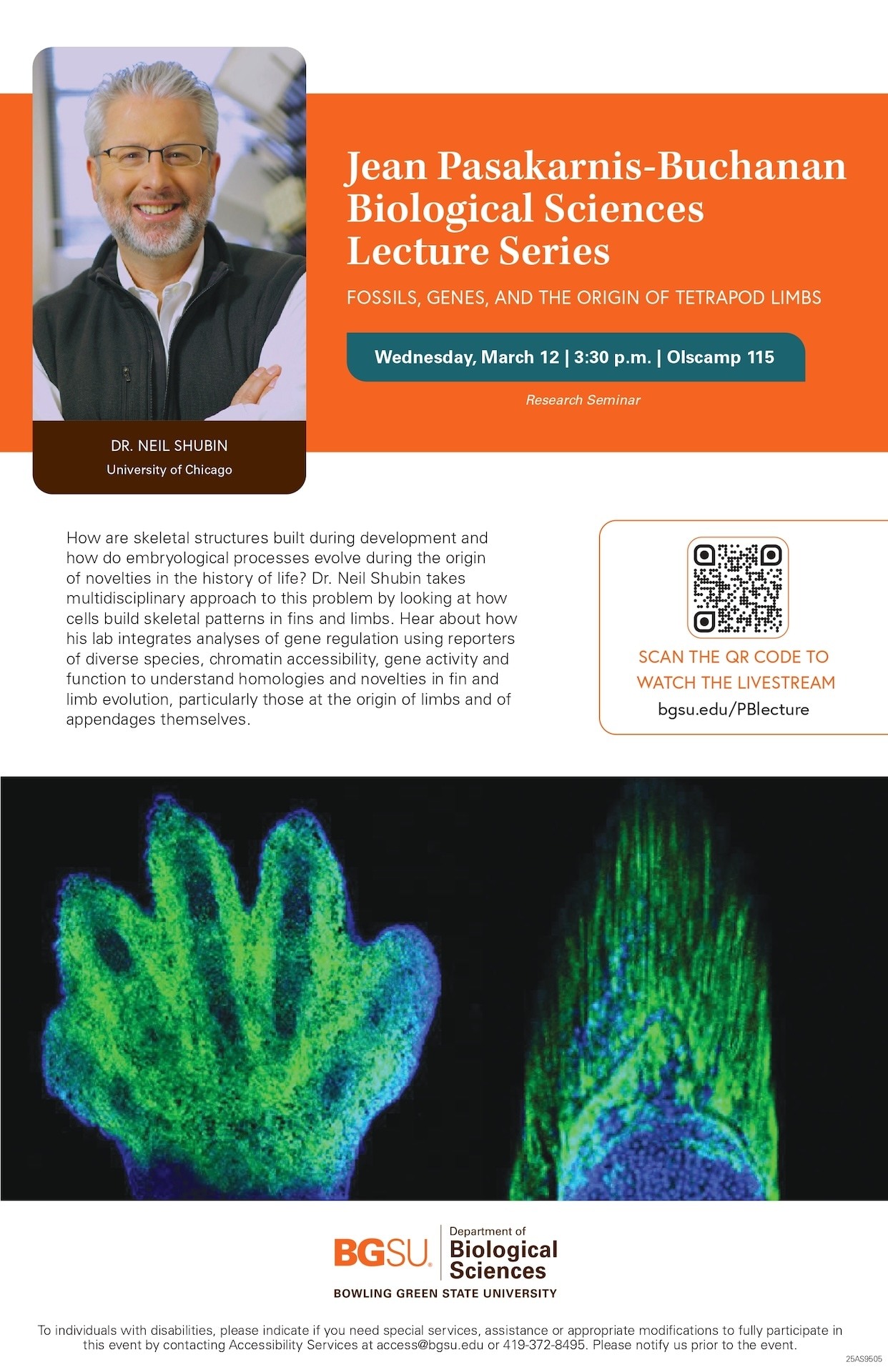Departmental Seminar, Grad Research & Pasakarnis-Buchanan Lecture
SPRING 2026
Seminars are held each week Wednesday at 3:30pm in McLeod Hall 220.
To schedule a seminar or for any questions related to our seminar series, please contact Dr. Bidart (gbidart@bgsu.edu).
| ||||||||
| Date | Speaker | Seminar Title | Host | |||||
Jan 14 | BGSA - TBA | BGSA meeting – Graduate Students Only | BGSA | |||||
Jan 21 | Dr. Ken Paige, University of Illinois at Urbana-Champaign | Virtual seminar: The Phenomenon of Overcompensation: from Basic to Applied Science | Gabriela Bidart | |||||
Jan 28 | Dr. Heather Conti, University of Toledo | Towards a unified understanding of IL-17 signaling during oral mucosal immune responses | Andy Wagner | |||||
Feb 4 | Dr. Fausto Machado Da Silva, University of Toledo | Redox processes and dynamics at terrestrial-aquatic interfaces. | Kevin McCluney | |||||
Feb 11 | Dr. Gunjan Agarwal, The Ohio State University | Applications of AFM in Cell-Matrix Interactions | Carol Heckman | |||||
Feb 18 | Dr. Connor Morozumi, University of Louisville | Plant-fungal mutualisms: investigating multispecies interactions in a changing world | Sarah Emery | |||||
Feb 25 | Dr. Ashley Leach, The Ohio State University | Ohio specialty crop pest management | Dan Pavuk | |||||
March 4 | SPRING BREAK! | |||||||
March 10, 11 | Dr. David Lodge, Cornell University | PASAKARNIS-BUCHANAN LECTURES Public seminar (Tues, March 10th 7pm) Scientific seminar (Wed, March 11th, 3:30pm) | ||||||
March 18 | Madison Alexander, BGSU, Dissertation Seminar | The effects of fear and safety on prey morphology and behavior | Paul Moore | |||||
March 25 | Dr. Daryl Dwyer, The University of Toledo | Coupling Ecosystem Restoration to Water Quality Improvements | Gabriela Bidart | |||||
April 1 | Dr. Steven Price, University of Kentucky | Coal Mining and Amphibians: Lessons from 10+ years of research in the Central Appalachians | Mason Murphy | |||||
April 8 | Dr. Francis Fang, The Ohio State University | Epigenetic mechanisms of Phytophthora pathogenesis | Paul Morris | |||||
April 15 | Dr. Phillip Palmbos, University of Michigan | Virtual Seminar: Understanding the Drivers of Bladder Cancer Invasion | Carol Heckman | |||||
April 22 | Dr. Lorrayne Miralha, The Ohio State University | Pollution Pathways in the Western Lake Erie Basin: Metals, Nutrients, and Manure Across Scales | Kevin McCluney | |||||
| RECENT PAST SPEAKERS: FALL 2025 SEMINAR SCHEDULE | ||||||||
Date | Speaker | Seminar Title | Host | |||||
Aug 27 | BGSA | BGSA meeting – Graduate Students Only | BGSA | |||||
Sept 3 | Dr. Andy Suarez, University of Illinois at Urbana-Champaign | Virtual: Patterns and consequences of worker size variation in ants | Gabriela Bidart | |||||
Sept 10 | Dr. Christopher Gobler, Stony Brook University | Climatic warming and unique nitrogen acquisition strategies expand the niche of Microcystis blooms in the eastern US | George Bullerjahn | |||||
Sept 17 | Dr. Masako Hadara, Michigan State University | Virtual: Extracellular Vesicles: Nature’s Communication System Reimagined for Therapeutic Delivery | Jill Zeilstra | |||||
Sept 24 | Dr. Matt Tuttle, Air Force Laboratory Research | Biomineralization of calcium carbonate using Sporosarcina pasteurii for scalable biocement production | Andy Wagner | |||||
Oct 1 | Dr. Mahasin Osman, University of Toledo | The Doppelganger of Cancer and Diabetes: role of a signaling scaffold in the link between the two diseases | Carol Heckman | |||||
Oct 8 | Dr. Heather Hendrickson, University of Canterbury, New Zealand | Virtual: The buzz on phages to protect honeybees | Hans Wildschutte | |||||
Oct 15 | Dr. Valoree Gagnon, Michigan Technological University | Virtual: Bridging Western & Indigenous knowledges in research partnerships: Practicing the “Seasons of Research” framework | Hans Wildschutte | |||||
Oct 22 | Dr. Jennifer Hellmann, Ohio State University | Predator-induced transgenerational plasticity of parental care behavior in male three-spined sticklebacks | Jeff Miner | |||||
Oct 29 | Dr. Vikas Kumar, Visiting Scholar and BGSU Alumnus | The interplay of nutrition and genetics improves the diet utilization in salmonids | Paul Morris | |||||
Nov 5 | Dr. Klaus-Peter Koepfli, George Mason University, Smithsonian-Mason School of Conservation | Decoding Survival: Comparative and Population Genomics Informs the Conservation of the Endangered Black-footed Ferret | Julia Halo | |||||
Nov 12 | Dr. Daniel Pavuk, Bowling Green State University | Factors Affecting Insect Abundance and Diversity in Managed and Natural Ecosystems | ||||||
Nov 19 | Dr. Emily Rauschert, Cleveland State University | Time is on our side: meadow restoration outcomes improve with time since restoration | Sarah Emery | |||||
Nov 26 | No Seminar -- Thanksgiving | |||||||
Dec 3 | Dr. Jonathan Jacobs, The Ohio State university | Loss of ice nucleation shifts bacterial dispersal strategies | Hans Widschutte | |||||
Graduate Research-in-Progress (GRIP) is a seminar series for graduate students to present their research ideas and progress to other graduate students (and faculty). The goals for attending and presenting are to increase awareness of research across the discipline, to hone presentation skills essential for conveying scientific knowledge, to promote critical thinking skills, and to build camaraderie among graduate students. Students are encouraged to present yearly, so they get feedback early in the developmental stages of their research, as well as later when they have obtained some results and are trying to organize these within their conceptual framework.
The GRIP schedule for the Semester is below.
- GRIP is held every Friday at 12:30pm in LSC 334. All are welcome.
- If you would like to sign up to present, contact Dr. Wildschutte
Presenters, please remember to:
- Introduce yourself--include status in graduate program or affiliation.
- Describe the purpose of the talk; i.e., is it practice for a conference, or a discussion of ideas?
- You will be presenting to a wide audience. Initially, put your work into a broad biological conceptual framework, so that everyone can understand the focus of your research. You can then go into depth, but remember to return to the ‘big picture’ as you conclude/summarize.
- It is suggested that you have a presentation review with your faculty mentor before you finalize your presentation.
| Date | Student / Lab | Presentation |
| 8/29/2025 | Organizational meeting | |
| 9/5/2025 | Organizational meeting | |
| 9/12/2025 | Mira Ebersole / Wagner lab | Candida reactions to pate of mouse kidneys; a study on pathogen-envirionment interactions |
| 9/19/2025 | Grant Hayden / Metcalf Lab | Non-Photosynthetic Cyanobacteria: An Unculturable Culprit in Neurodegenerative Disease |
| 9/26/2025 | Michael Fyfe / Wildschutte lab | The Power of Using Augmented/Virtual Reality to Gain a Better Understanding of Complex Molecules |
| 10/3/2025 | Madison Altieri / Larsen Lab | Bacteriophage-Antibiotic Synergy in Aeromonas salmonicida |
| 10/10/2025 | Hsin-Ho Wei / Dr. Vipa Lab | Aquatic Health: A CRISPR-Based Biosensor for Rapid On-Site Detection of Saprolegnia |
| 10/17/2025 | Patrick Casto / Wiegmann Lab | TBD - whip spider navigational behavior |
| 10/24/2025 | Nara Souza / Wildschutte lab | Drug use and the rise of fungal pathogens |
| 10/31/2025 | Sean McGowan / Metcalf Wildschutte labs | TBD |
| Michael Fyfe / Wildschutte lab | Identification of Novel Antimicrobial Compounds from aquatic Pseudomonas Isolates | |
| 11/7/2025 | Trevor DeGroote: McCluney Lab | Effects of Differing Hydrology on Wetland Plant Traits, Biomass, and Nutrient Composition |
| Julia Obuya: McCluney/Ward lab | Expanding Long-Term Microbial Insights in Sandusky Bay with Multi-‘Omics Approaches | |
| 11/14/2025 | Zach Szepiela / Neves Lab | Effects of Diet on Otolith Compostion and Growth In Steelhead Trout, Oncorhynchus mykiss |
| Trevor Stamp / Murphy Lab | The Influence of Land Type and Dietary Factors on the Sublethal Disease Dynamics of Batrachochytrium dendrobatidis | |
| 11/21/2025 | Reese Jackson / McCluney Lab | Maxent modeling with urban bees |
| 11/28/2025 | Thanksgiving, no class | |
| 12/5/2025 | Award presentation and celebration lunch |
Dr. Neil Shubin (University of Chicago)
Ends of the Earth: Finding Our Place in Nature in Polar Regions (Public Lecture), Thursday, April 17, 2025 at 7 p.m., Bowen-Thompson Student Union Theater, Room 206
Fossils, Genes, and the Origin of Tetrapod Limbs (Scientific Lecture), Friday, April 18, 2025 at 2:00 p.m., Olscamp Hall 115


Previous Pasakarnis-Buchanan Lectures
Thursday, April 17, 2025 at 7 p.m., "Ends of the Earth: Finding Our Place in Nature in Polar Regions" (Public Lecture) by Dr. Neil Shubin (University of Chicago) Bowen-Thompson Student Union Theater, Room 206. Fossils, Genes, and the Origin of Tetrapod Limbs (Scientific Lecture), Friday, April 18, 2025 at 2:00 p.m., Olscamp Hall 115
Tuesday, March 26, 2024 @ 7:00PM, “The Serengeti Rules: The Regulation and Restoration of Biodiversity” (Public Talk), featuring Sean B. Carroll (University of Maryland). In the Bowen-Thompson Student Union Theater.
Thursday, April 13, 2023 @ 7:00PM, Crises Abound: Health, Climate, Energy, Food, Pandemics... How Large-Scale Systems Biology Can Help Address the Major Challenges We Are Facing (Public Talk), featuring Dan Jacobson (Oak Ridge National Laboratory). In the Bowen-Thompson Student Union Theater.
Thursday, March 24, 2021, @ 7:00PM, Fish Whispering: Exploring Environmental Impacts from Life History and Eco-Geochemistry (Public Talk) featuring Dr. Karin Limburg.
**Due to precautions taken to prevent the spread of COVID-19, the 2020 Pasakarnis-Buchanan lecture was canceled.
Tuesday, April 9, 2019, @ 7:00PM, Forecasting Nature: Ecological Experiments in a Time of Planetary Change (Public Talk) featuring Dr. Nicholas Gotelli.
Tuesday April 3, 2018 @ 7PM (Public Talk) "Digging for genes that affect behavior" (Public Talk) featuring Dr. Hopi Hoekstra (Harvard University).
Tuesday April 4, 2017 @ 7PM (Public Talk) "Eco-Evo-Devo: the synthesis of epigenetics, medicine and evolution". Scott Gilbert (Swarthmore College).
Thursday, April 14, 2016 @ 7:00PM (Public Talk): "Resurrecting Ancient Proteins from Extinct Life" featuring Dr. Steven Benner (The Foundation for Applied Molecular Evolution, FAME).
Tuesday, March 24, 2015: Dr. Tyrone Hayes (University of California, Berkeley). Dr. Hayes's topic was From Silent Spring to Silent Night: A Tale of Toads and Men.
Tuesday, April 22, 2014: Dr. Arturo Casadevall (Albert Einstein College of Medicine). Dr. Casadevall's topic was Thoughts on the Origin of Virulence.
Tuesday, March 21, 2013: Dr. P. Dee Boersma (University of Washington). Dr. Boersma's topic was Penguins as Marine Sentinels.
Thursday, April 12, 2012: Dr. Jianzhi Zhang (University of Michigan). Dr. Zhang's topic was On the path to humanity: genes lost, gained, and modified during primate evolution.
Tuesday, April 19, 2011: Dr. Nils Walter (University of Michigan). Dr. Walter's topic was Chemistry of Life: Driving Force for the Evolution from Cyanide to the RNA World to Mankind.
Updated: 01/09/2026 11:22PM
